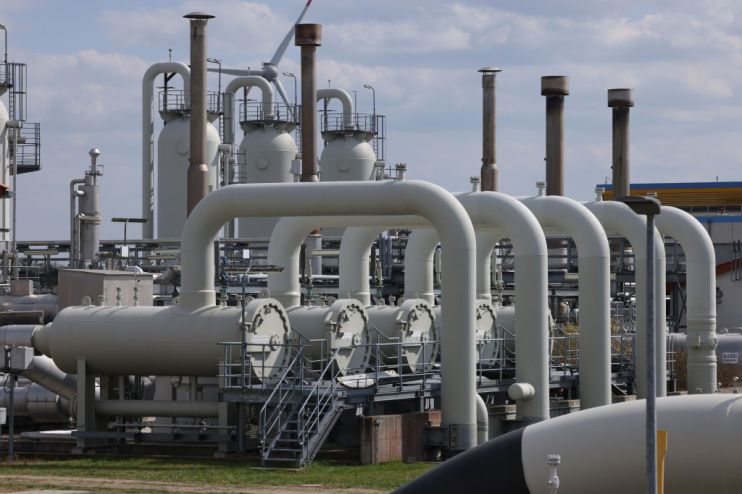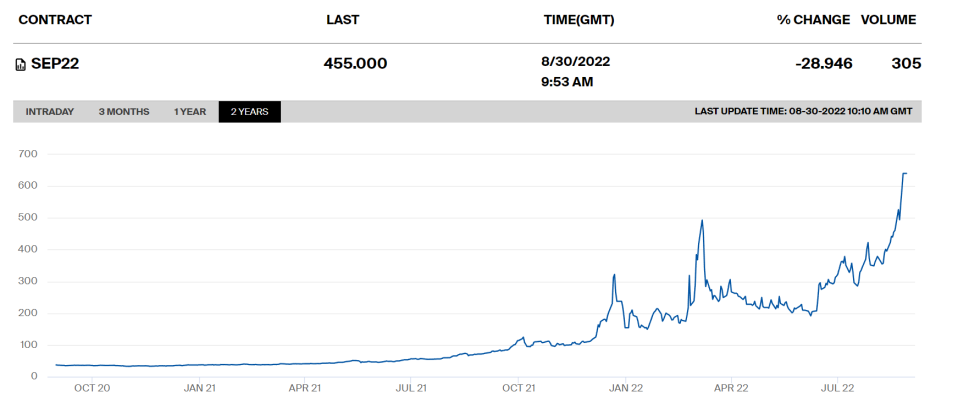Gas prices plunge as Germany closes in on storage targets

Gas prices have fallen sharply today amid reports Germany is on course to meet its gas storage targets for October.
Prices dropped five per cent on the Dutch benchmark, and a whopping 29 per cent in the UK – with domestic investors relieved that Britain is likely to have one less competitor for supplies in the early winter.
The UK has limited capabilities to store natural gas, and is currently scrambling to put the Rough storage site in the North Sea back online ahead of the coldest months of the year.
German Economy Minister Robert Habeck is confident Germany won’t have to pay the high spot prices for gas currently commanding the market.
“As a result, the markets will calm and go down,” he said,.
He argued that gas prices had shot up recently due to high demand alongside speculation, which could not be sustained long term.
Germany’s gas storage facilities are nearly 83 per cent full and are on course to hit 85 per cent in early September.
This is well ahead of its goal for gas storage levels to be 85 per cent filled by October, with the country now targeting 95 per cent by November.

The decline in prices follows record surges which saw prices peak at all-time highs amid a Russian squeeze on European supplies.
Ole Hansen, head of commodity strategy at Saxo Bank, told City A.M. that the fall in prices reflects a more “sanguine” approach in the market to various macrofactors.
He said: “It seems like the market is adapting a bit more sanguine approach to Gazproms upcoming maintenance and the prospect for gas supplies to resume following the three-day shut down. In addition, EU discussion about intervening in the gas and power market is also weighing.”
However, Hansen warned the market remains “very volatile” and that “some very trigger-happy longs” will want to get out at the first sign of market reversals.
He concluded: “Providing water levels on the Rhine continue to rise, thereby normalising the flow of diesel and coal and Gazprom resuming supplies after maintenance we could see the price of gas return to the €200 area.”
European gas prices are currently trading at around €258 per megawatt hour.
Gas prices volatile amid challenging headwinds
Nevertheless, there are headwinds which reflect the urgent nature of the crisis this winter.
Nathan Piper, head of oil and gas research at Investec, noted that a key reason for the fall in gas prices was Europe “paying eye-watering prices” for liquefied natural gas instead.
He said: “We anticipate this is a pause for breath ahead of winter gas demand increasing for heating and increasing competition for LNG from Asia as winter starts there too. The unknown remains if Gazprom restarts delivering gas through the Nordstream 1 pipeline following the three day ‘maintenance’ shut down expected to start 31 August or if the shutdown is extended.”
Kremlin-backed gas giant Gazprom has announced it will shut the Nord Stream 1 pipeline for three days from tomorrow to undertake maintenance of a pumping unit.
This has raised fears of a sustained closure, after the latest round of maintenance saw flows reduce from 40 to 20 per cent.
Russia has claimed reduced flows are a consequence of technological problems caused by western sanctions.
However, Gazprom has slashed gas flows into France, informing utility giant Engie it is reducing deliveries from today due to a disagreement on the application of contracts.
While Engie has reduced its reliance on Russian energy since the invasion of Ukraine, the move piles further pressure on Europe as winter looms.
Elisabeth Borne, France’s Prime Minister, urged companies to draft energy savings plans by next month, warning they would be hit first if ever France is left with no choice but to ration the supply of gas and electricity.
Germany has brought in its own rationing measures and triggered the second of a three phase emergency plan that could lead to its government confiscating and divvying out supplies.
It will also impose a gas levy on consumers from October 1 through to March 2024 as part of measures to ensure utility companies remain liquid enough to maintain an intact gas market.
The wider EU bloc has agreed to 15 per cent voluntary gas cuts over the winter and into Spring.
Meanwhile, Uniper has requested additional funding from the government for its bailout, raising the cost of saving the struggling utility giant to €19bn (£16bn).
Habeck confirmed that Germany will not allow a Lehman Brothers-style collapse to happen to its gas market.
He said: “I promise on behalf of the German government that we will always ensure liquidity for all energy companies, that we don’t have a Lehman Brothers effect on the market.”